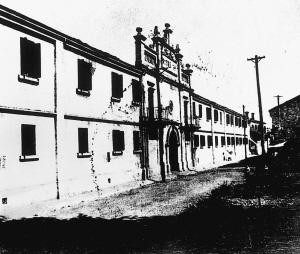More languages
More actions

The 5th National Congress of the Communist Party of China (中国共产党第五次全国代表大会) was held in Wuhan from April 27 to May 9, 1927. 110 representatives attended the meeting representing 57,967 party members. Some of the notable members that attended were Chen Duxiu, Cai Hesen, Qu Qiubai, Mao Zedong, Ren Bishi, Liu Shaoqi, Deng Zhongxia, Zhang Guotao, Zhang Tailei, Li Lisan, Li Weihan, Chen Yannian, Peng Pai, Fang Zhimin, Yun Daiying, Luo Yinong, Xiang Ying, Dong Biwu, Chen Tanqiu, Su Zhaozheng, Xiang Jing Yu, Cai Chang, Xiang Zhongfa, Luo Zhanglong, Ruan Xiaoxian, Wang Hebo, and and Peng Shuzhi.[1]
Chen Duxiu's Report[edit | edit source]
Chen Duxiu made a report to the congress on behalf of the 4th Central Executive Committee titled "Report on Politics and Organization". This report covered 11 issues including China's various classes, land, leadership of the proletariat, the military, and the relationship between the KMT and the Communist Party. Criticism was made on the report as it neither summed up experience and lessons correctly, nor proposed principles and policies to save the current situation. Instead, it defended past mistakes and continued to put forward some erroneous claims. In response to Chen Duxiu, Luo Yi made a speech entitled "The Problem of the Chinese Revolution and the Role of the Proletariat" and Qu Qiubai wrote the book "Controversial Issues in the Chinese Revolution". Criticism of the report was also made by Cai Hesen and Mao Zedong.[1]
Measures Passed[edit | edit source]
The 5th National Congress of the Communist Party of China passed "Political Situation and the Party's Task Resolution", "The Land Issue Resolution", among other measures.[1]
Election Results[edit | edit source]
A new central executive committee was elected with 31 members and 14 alternate members. The subsequent First Plenary Session of the Fifth Central Committee elected Chen Duxiu, Cai Hesen, Li Weihan, Qu Qiubai, Zhang Guotao, Tan Pingshan, Li Lisan, and Zhou Enlai as members of the Political Bureau of the Central Committee and Su Zhaozheng, Zhang Tailei, etc. as alternate members. Chen Duxiu, Zhang Guotao, and Cai Hesen were elected as executive members of the Political Bureau of the Central Committee Committee members, with Chen Duxiu as the general secretary. The General Assembly elected the Central Supervisory Committee for the first time, consisting of 7 full members and 3 alternate members.[1]
Outcome[edit | edit source]
Although the Party’s Fifth National Congress criticized Chen Duxiu’s mistakes, they did not address such pressing issues as how the proletariat strives for leadership, how to lead the peasants to carry out the agrarian revolution, how to deal with the Wuhan Nationalist Government and the Kuomintang, and how to establish the party’s revolutionary armed forces. Therefore, it was difficult to undertake the important task of saving the revolution at the critical moment of life and death. It was at the August 7th Conference three months later that the opportunist mistakes committed by the central government were truly ended, and the correct guidelines for agrarian revolution and armed uprisings were formulated. [1]
